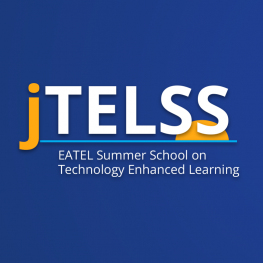Speakers
Maka Eradze
University of L’Aquila, ItalyErna Engelbrecht
Delft University of Technology, the NetherlandsMartina Manna
University of L’Aquila, ItalyEmanuele Bardone
University of Tartu, EstoniaStart
14/05/2024 - 16:00
End
14/05/2024 - 19:00
Challenging the TEL research and development: designing and evaluating educational innovation
Tuesday 14/05 16:00-19:00h
Workshop Space B
Needs Analysis
Designing sustainable, responsible, and useful educational innovation is one of the most important ontological, epistemological, and methodological challenges in technology-enhanced learning. Not only do we entertain certain scenarios embedded in specific socio-technical imaginaries and implement our ideas through the design of certain technological artefacts, but we also create educational innovation based on them. These imaginaries can be based on previous research, certain policies, or societal anticipations. The same imaginaries fed into the development and evaluation of theoretical insights for PhD projects, very often connected to the simultaneous development of learning technologies. On the other hand, successfully implementing TEL innovations in education can be cumbersome. Evaluating their impact can be even more complicated and is often reduced to student surveys.
With this workshop, first, we invite researchers to reflect and understand the implications of the abovementioned concepts. Afterward, we reflect on how research (theory/pedagogy) and development (design/technology) processes can be balanced, going beyond dichotomies of pedagogy and technology by analysing and showcasing two approaches used in TEL – Design-Based Research and Research-based Design. Finally, participants will apply a practical framework to develop a customized evaluation plan that suits their innovation and its context of implementation. The framework will guide participants in aligning relevant evaluation criteria (Value) with a deliberately chosen evaluation purpose (Use) and data collection and reporting (Methods) drawn from Social Science research.
Learning Objectives
By the end of the workshop, participants will be able to:
- Problematize and discuss the concept of innovation and the problems these innovations stems from;
- Describe an innovation and its implications for implementation;
- Understand how to balance between research and development;
- Understand how to tackle TEL innovation challenges;
- Develop an evaluation plan that is customized to suit your chosen innovation;
- Demonstrate the alignment between the purpose of the evaluation purpose, the evaluation criteria, and the evaluation methods;
- Create a design research idea based on the problematized concepts.
Pre-activities
(Optional) Think of an educational innovation from your own context which you would like to evaluate.
Session Description
- Introduction of different concepts in educational innovation
- Activity 1 – Imaginaries and counterfactuals activity: imagine an alternative future with tools!
- Introducing the designing concept and two methodologies of design and research
- Activity 2- Planning and analysing your TEL innovation
- Activity 3 – Developing an evaluation plan




